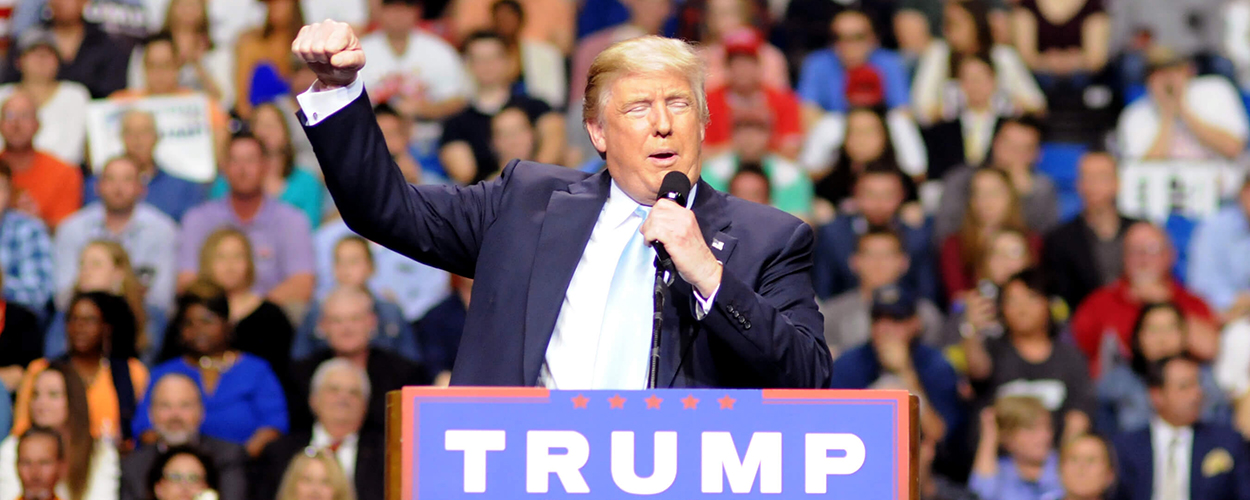This website uses cookies so that we can provide you with the best user experience possible. Cookie information is stored in your browser and performs functions such as recognising you when you return to our website and helping our team to understand which sections of the website you find most interesting and useful.
And Finally Artist News Business News Labels & Publishers Legal
Village People record label says it will sue over Trump YMCA video
By Andy Malt | Published on Monday 9 November 2020

The record label behind the Village People has said that it plans to sue Donald Trump over his use of ‘YMCA’ in a video he shared on Twitter as the polls opened in the US last week.
Speaking to Agence France-Presse, President of French label Scorpio Music, Jonathan Belolo said: “The beneficiaries of [band co-founders] Messrs Jacques Morali and Henri Belolo, like the company Scorpio Music, owner of the work, discovered with amazement this illicit appropriation, which is … for [the] partisan and electoral purposes of Donald Trump, which they would never have accepted”.
He added that a legal complaint would be submitted in France and the US “in the next few days”.
Trump’s use of ‘YMCA’ to close his political rallies during his failed campaign to win a second term as US President has been a topic of much discussion. The band’s Victor Willis spoke out publicly to ask the President not to use the song. However, he has also said that copyright law was likely on the President’s side because of the blanket licensing system.
That is often true when Trump uses music at public events, though not if he formally uses a track in a video posted online. Such usage almost certainly requires bespoke licences for both the recording and the song. And the video Trump shared last Tuesday, which used footage of the President dancing to ‘YMCA’ to make a new music video, had no such licences.
However, the case for copyright infringement against the outgoing President is not quite as clear cut as it may initially seem. Although Trump shared the video on social media, it was not created by his campaign team, rather a third party. Therefore it might be the third party that Scorpio should be suing. So it remains to be seen if the label does go through with legal action and, if so, exactly who it chooses to target.
Willis, meanwhile, is taking a very different route. He is calling for changes to be made to US copyright law in order to make it more difficult for politicians to use music against the wishes of the artists who made that music. This, of course, is a long-running discussion in the artist community, which pre-dated Trump, though became much more discussed after he entered politics.
This mainly relates to politicians playing music at events. When songs are played in public spaces, their use is usually licensed via the collective licensing system, so in the US via BMI, ASCAP and the smaller performing rights organisations.
Collecting societies usually provide blanket licences meaning that, once a licensee signs up, they can make use of any of the songs included in that society’s repertoire.
Now, while most venues used for political events will already have licences, BMI and ASCAP also have specific licences for political campaigns, and the Trump campaign had itself one of those licences. And with that licence, members of the societies are able to opt out on a case-by-case basis. A number of artists, including Rihanna and The Rolling Stones, have done just that.
However, there are still some questions regarding quite how those opt-outs work, given past rulings in the rate courts that regulate the big US societies that said that songwriters and publishers need to be “all in” or “all out” when it comes to collective licensing. So you can’t, for example, stop bars from using your music because you don’t like alcohol, but continue to have your music played in cafes because you really love coffee.
Therefore, some specific reforms to copyright law in this domain would be helpful.
In a statement to Rolling Stone, Willis says: “I’ve consistently stated that neither me, nor Village People, endorsed [Trump’s] use of our music and we did demand he cease and desist back in June. However, copyright law made it possible for him to ignore us. As a result, we were never in a position to bring a viable suit in an attempt to stop his use. That is why I’m asking artists and copyright owners to join me in an effort to lobby [for] changes to blanket licensing”.
“Admittedly though”, he adds, “[Trump’s] use resulted in ‘YMCA’ returning to the charts after over 40 years. So, I have to at least credit his campaign for this resurgence”.
Willis would likely find plenty of support in the artist community for the reforms he’s proposing. Although, with Trump gone, the issue may now fade a little. Although politicians using music without permission has long been an issue, as noted, it has more frequently hit the headlines during Trump’s brief dalliance with politics. Partly because most politicians are not so willing to ignore the wishes of artists who oppose them, nor do most politicians inspire the level of opposition that Trump has.
Though, while it might all become less of an issue for the music community in the post-Trump age, it may still be worth pursuing reforms now. There’s still the chance that Trump may stand again in 2024, or – more likely – one of his children will go for the presidency at some point, with a similarly dismissive approach to the wishes of artists.





